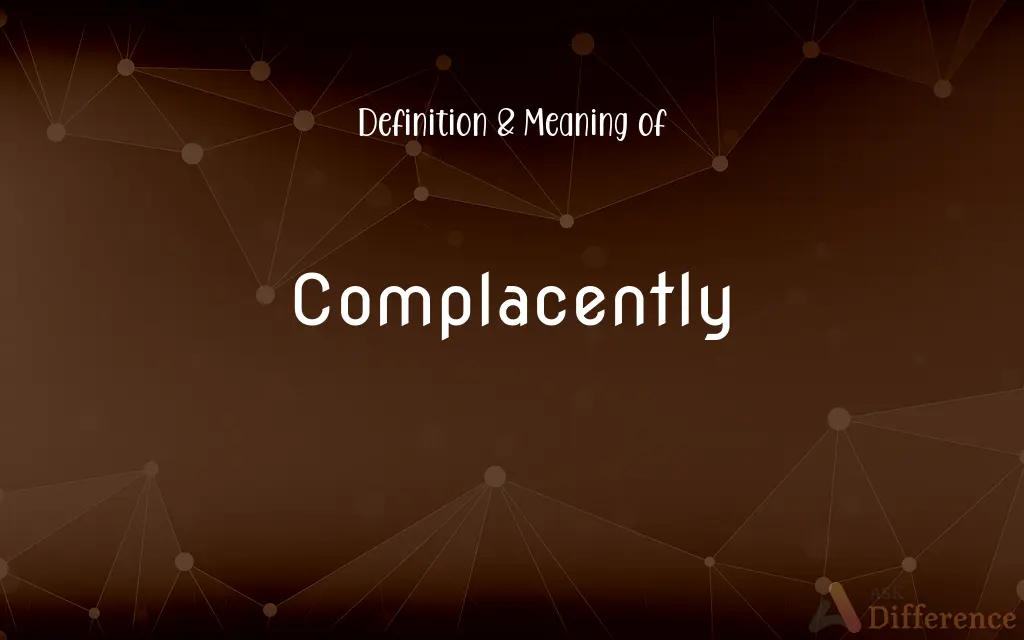Complacently Definition and Meaning
By Tayyaba Rehman & Fiza Rafique — Updated on March 5, 2024
"Complacently" describes an attitude of self-satisfaction, often without awareness of potential dangers or flaws, accompanied by a lack of effort to improve. e.g., He smiled complacently after winning the game.

Table of Contents
Complacently Definitions
Complacently refers to being content with one's achievements.
He sat complacently, not striving for more.
Complacently describes behaving in an unconcerned manner.
They complacently overlooked the need for change.
Complacently denotes an attitude of indifference to potential risks.
She complacently assumed everything would work out.
Complacently pertains to being overly satisfied with the status quo.
She accepted the decision complacently, without question.
Complacently can describe an attitude of self-contentment.
The team became complacently confident in their lead.
Complacently can mean showing no interest in improvement.
He complacently settled for average results.
Complacently means showing smug or uncritical satisfaction with oneself.
She nodded complacently, unaware of the challenges ahead.
Complacently involves being self-satisfied to the point of inaction.
The company operated complacently in a competitive market.
Complacently can refer to being content in ignorance.
They complacently accepted the outdated methods.
Complacently is used for showing a lack of concern or vigilance.
He complacently ignored the warning signs.
Satisfied with the current situation and unconcerned with changing it, often to the point of smugness
"a geologic cautionary tale for a complacent world accustomed to reliable infusions of cheap energy" (Paul Roberts).
Eager to please; complaisant.
In a complacent manner; overly calm and contented; not troubled.
In a complacent manner.
In a self-satisfied manner;
He complacently lived out his life as a village school teacher
Complacently Snonyms
Self-satisfiedly
With an uncritical satisfaction with oneself or one's achievements.
He nodded self-satisfiedly, not noticing the problems his plan caused.
Contentedly
In a way that expresses happiness or satisfaction.
She sighed contentedly after finishing a delicious meal.
Unconcernedly
Without concern; indifferently.
They went about their day unconcernedly, unaware of the impending storm.
Serenely
In a calm, peaceful, and untroubled manner.
He accepted the decision serenely, without protest.
Nonchalantly
In a casually calm and relaxed manner.
He shrugged nonchalantly, unfazed by the news.
Smugly
In a self-satisfied manner.
He smiled smugly, confident in his victory.
Blissfully
In a blissful and joyously unaware state.
They were blissfully ignorant of the challenges that lay ahead.
Pleasedly
In a pleased manner; showing that one is pleased.
She looked on pleasedly as the children played.
Self-assuredly
With confidence in one's own abilities or character.
She walked into the interview room self-assuredly.
Easily
Without difficulty or effort.
She complacently (easily) accepted the changes, not bothering to question them.
Complacently Idioms & Phrases
Nod complacently
To agree without critical thought or consideration, often out of self-satisfaction or indifference.
During the meeting, they just nodded complacently, missing the urgency of the situation.
Sit complacently
To remain satisfied with one's current situation without seeking improvement or acknowledging potential issues.
They sat complacently as their competitors innovated, ultimately falling behind in the market.
Smile complacently
To smile with self-satisfaction, often without awareness of potential trouble or failure.
He smiled complacently at the critiques, unaware of the serious flaws in his plan.
Accept complacently
To accept a situation or outcome without question or desire for change, often due to self-satisfaction.
The team accepted their mediocre results complacently, without striving for excellence.
Live complacently
To lead one's life in a self-satisfied manner without striving for growth or acknowledging risks.
Living complacently, he missed many opportunities for personal and professional development.
Stand complacently
To remain inactive or indifferent in situations that typically require action or concern.
The citizens stood complacently by as their rights were slowly eroded.
Watch complacently
To observe events unfold without taking action, often due to a misplaced sense of security.
The management watched complacently as employee morale plummeted.
Respond complacently
To reply or react to challenges, criticism, or suggestions without genuine engagement or concern.
She responded complacently to the feedback, not really intending to make any changes.
Agree complacently
To concur with opinions, plans, or actions without critical thought, due to satisfaction with one's own perspective.
The committee agreed complacently with the proposal, failing to foresee its shortcomings.
Follow complacently
To support or go along with someone or something without questioning or asserting oneself.
They followed the outdated practices complacently, never considering innovation.
Act complacently
To perform actions without urgency, enthusiasm, or awareness, often satisfied with the status quo.
They acted complacently in the face of impending changes, assuming everything would work out without effort.
Work complacently
To carry out one's job duties without ambition, improvement, or active engagement.
Working complacently, he overlooked ways he could have advanced in his career.
Behave complacently
To conduct oneself with an unearned confidence and lack of critical self-assessment.
Despite the emerging crisis, the leadership behaved complacently, believing their position was secure.
Listen complacently
To hear information or advice without truly considering it or feeling the need to act upon it.
They listened complacently to the warnings, convinced that their project was without flaw.
Engage complacently
To participate in an activity or conversation without genuine interest or concern for the outcome.
He engaged complacently in the discussion, not really interested in the topic.
Drift complacently
To move through life or situations without direction or purpose, satisfied with wherever one ends up.
Drifting complacently through his career, he later regretted not setting goals.
Rest complacently
To be at ease with one's current achievements or situation, without ambition for more.
After the initial success, the company rested complacently, ignoring the need for continuous improvement.
Complacently Example Sentences
The workers carried out their tasks complacently.
He complacently assumed his lead was unassailable.
They watched the show complacently, not expecting much.
He complacently believed he knew all the answers.
The manager complacently overlooked the team's concerns.
She complacently accepted the praise without striving to improve.
The students complacently ignored the need for study.
They complacently enjoyed their success, ignoring future challenges.
They complacently believed their project was the best.
She complacently settled into her routine.
He complacently ignored the advice to diversify his skills.
She lived her life complacently, never seeking new experiences.
The athlete trained complacently, underestimating his competition.
He complacently dismissed the need for further research.
The government acted complacently, despite the looming crisis.
Common Curiosities
Why is it called complacently?
It is called "complacently" because it describes the manner of being pleased with oneself or one's situation to the point of not recognizing potential danger or defect; derived from "complacent," which comes from Latin "complacere" meaning "to please greatly."
How many syllables are in complacently?
There are four syllables in "complacently."
How is complacently used in a sentence?
"He sat back complacently, confident that he had done enough to secure the deal."
How do we divide complacently into syllables?
Complacently is divided into syllables as com-pla-cent-ly.
What is the pronunciation of complacently?
Complacently is pronounced as /kəmˈpleɪsəntli/.
What is a stressed syllable in complacently?
The stressed syllable in "complacently" is "pla."
What is the root word of complacently?
The root word is "complacent."
What is another term for complacently?
Another term for "complacently" could be "smugly" or "self-satisfiedly."
What is the plural form of complacently?
As an adverb, "complacently" does not have a plural form.
Is complacently an adverb?
Yes, "complacently" is an adverb.
Is complacently an abstract noun?
No, "complacently" is not a noun; it is an adverb.
What is the verb form of complacently?
"Complacently" is an adverb. The related verb form would be "complacate," but it is not commonly used. "Complacent" is the adjective form.
What part of speech is complacently?
"Complacently" is an adverb.
Is the word complacently Gerund?
"Complacently" is not a verb, so it does not have a gerund form.
Which determiner is used with complacently?
Determiners are not typically used with adverbs like "complacently."
Which vowel is used before complacently?
Articles or vowels are not typically used directly before adverbs like "complacently."
Which article is used with complacently?
Articles are not typically used with adverbs like "complacently."
What is the singular form of complacently?
"Complacently" is an adverb and does not have singular or plural forms.
What is the opposite of complacently?
The opposite of "complacently" could be "anxiously" or "uneasily."
Is complacently a countable noun?
"Complacently" is not a noun; it's an adverb and therefore not countable.
Is the complacently term a metaphor?
"Complacently" can be used metaphorically to describe a state of being overly self-satisfied or untroubled in situations where caution or concern might be warranted.
Is the word “complacently” a Direct object or an Indirect object?
"Complacently" as an adverb cannot be a direct or indirect object. It modifies verbs, adjectives, or other adverbs.
Is complacently a noun or adjective?
"Complacently" is an adverb.
Is complacently a negative or positive word?
"Complacently" generally has a negative connotation, implying a lack of awareness or concern.
Is complacently a vowel or consonant?
The word "complacently" starts with the consonant "c."
Is complacently a collective noun?
No, "complacently" is not a noun and therefore cannot be a collective noun.
Is the word complacently imperative?
As an adverb, "complacently" cannot form an imperative. Imperatives are formed with verbs.
Which preposition is used with complacently?
Prepositions are not typically used directly with adverbs, but "complacently" can follow prepositions in a sentence, depending on context.
Which conjunction is used with complacently?
Conjunctions like "and," "but," or "or" can be used with "complacently" in compound sentences.
Share Your Discovery

Previous Term
Twisty Definition and Meaning
Next Term
Weary Definition and MeaningAuthor Spotlight
Written by
Tayyaba RehmanTayyaba Rehman is a distinguished writer, currently serving as a primary contributor to askdifference.com. As a researcher in semantics and etymology, Tayyaba's passion for the complexity of languages and their distinctions has found a perfect home on the platform. Tayyaba delves into the intricacies of language, distinguishing between commonly confused words and phrases, thereby providing clarity for readers worldwide.
Co-written by
Fiza RafiqueFiza Rafique is a skilled content writer at AskDifference.com, where she meticulously refines and enhances written pieces. Drawing from her vast editorial expertise, Fiza ensures clarity, accuracy, and precision in every article. Passionate about language, she continually seeks to elevate the quality of content for readers worldwide.

































